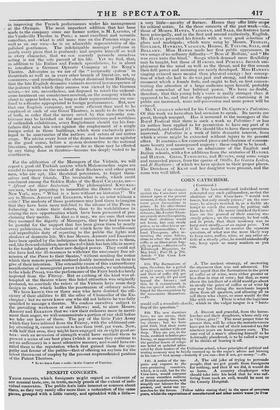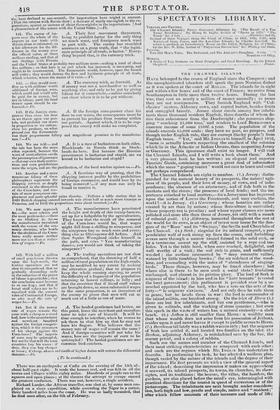137. One of the charges against the Corn-laws most insisted
upon at the present moment, is their tendency to cause great fluctuations in prices. In his after-dinner speech to his Manchester con- stituents, Mr.Poulett Thom- son gravely stated his opinion, that their abolition would not lower, but only steady prices, as in other lessor un- protected commodities. Co- lonel Thompson, after re- iterating the same fallacy, chose to select the article of coffee as an illustration hap- pily in point.—Black wood's Edinburvis Magazine, for May 1834 ; Part 11. p. 792. Article " The Corn Law Question."
lea
the one special article chap- A. The last-mentioned individual never reiterated any such gallimaufrey, as that the abolition of the Corn-laws " would not lower, but only steady prices ;" on the con- trary, be always resisted it, as a feeble at- tempt to catch the enemy by putting salt upon his tail. lie never attacked the Corn- laws on the ground of their causing un- steady prices ; on the contrary, he had said, and in print, that their tendency was to keep corn steady,—at an unjust price. Yet if he was invited to answer the separate question, of what was the most likely way to keep corn, coffee, wine, or any other ar- ticle at a steady price, he would undoubtedly say, keep open as ninny markets as you call.
1:38. The fluctuations of A. The ancient strategy, of answering corn, therefore, fur a period the argument that was not advanced. He of eight years, avei`aged 20, never urged that the fluctuations in the price and those of coffee 48i per of coffee or of wine, were either greater or cent, or nearly 2'.0 per cent less than in that of corn ; but that, us none beyond the former; and above the intellect of a child would go about this, be it remembered, in to steady the price of coffee or of wine by any way but letting the merchants import the ° economists themselves. legged for the comparison by them from all quarters, and allowing all to sell them who chose, so norm would do the like with corn. There is what the logicians would call a translatio eleneld; which in the vulgar tongue is a "hust- ling of the question."
A. Decent and graceful, from the horse- leeches and their daughters, whose only cry is "Give, give!" The most proper time to answer this, will be when the manufacturers have got to the end of their intended tax for nineteen years on home-grown corn. The sure end of a man's allowing himself to be habitually plundered, is to be called a rogue if he thinks of leaving it off.
A. The old joke of trying to persuade people, that we get goods from foreigners for nothing, and that if we did, it would do us harm. A country shopkeeper who should take into his head that he was suf- fering from such an evil, would be sent to the County Hospital. sial have declined to one-seventh, the importations have tripled in amount. [That the returns with Russia show] a decrease of nearly one-eighth in the ex- portations, against an increase of about three-eighths in the importations. [Anil a phenomenon of like nature with the United States.]—Ib.
141. The excess of im- ports over the whole of the exports in our trade with Russia alone is estimated, on a fair allowance for the dif- ference in the money over the official value, at three millions sterling, and that of our dealings with Prussia -
A. Their first movement thereanent, being to prohibit barter for the only thing we much want, and foreigners much want to part with. The enemy has stumbled unawares on a great truth, that " the legiti- mate principle of all trade, is barter." Every- thing beyond that, is the currency trick.
and the Punted States at probably two millions more—making a total of about five milliono ; so that here is an evil which has increased, is increasing, and ought to be counteracted. The Economists would, however, open the breach still wider ; they would destroy the first and legitimate principle of all trade, which is barter, where the means of it exist. —I b.
6. — they would over.. flow us with millions' worth additional of foreign corn, which could and would only he paid for in money, but not nn labour, until the fund drawn upon should be ex. Lausted.— lb.
A. The currency trick, as foretold. As if money was not a merchandise as well as anything else, and only to be got by giving labour for it somewhere,—unless somebody can show where it is to be got without.
A. If the foreign corn-grower close his door to our wares, the consequence must be to prevent his produce from coining within our portals. Against which, it is to be sup- posed the enemy will make no complaint.
rers b.
—that our own trade restric-
tions and corn prohibitions
144. We arc told and A. It is a race of barbarism on both sides. the tale has been the more Blockheads in Russia think as block- often repeated, because the heads do here. But because the Russian want of contradiction swells government is barbarian and stupid, are we the presumption of ignorance bound to be barbarian and stupid?
were the origin, and are the justification, of the fiscal warfare against RS.—Ib.
of the Corn-laws, and cer-
tain of most prosperous ens-
145. Another and a more A. A facetious way of proving, that the monstrous fallacy of these shipping interest profits by the prohibition philosophers represents the of foreign commerce, and would lose by its shipping interest as deeply being removed !—if any man can only be concerned in the abrogation found to receive it.
ployment and most splendid gains thereby. [Follows a table stating that in 1t420 British shipping entered inwards was about half as much more tonnage as Prussian, and in 18Vd, the proportions were about inverted.]—Ib.
146. We now approach &c.—the most solemn and the most perilous &c.—there is no blinking it, &c.-.• the manufacturer inoculated with the venom of the eco- nomic doctrine, who bawls for the abolition of the Corn- laws, really means neither more nor less than a redue- tims of wages.—lb.
147. With half a million of rural population thrown upon the high-roads, the trading operatives are not slow to comprehend that no gradually descending scale in the reduction of the prices of labour is practicable ; that the conclusion must become to ut one leap ; and that if breath stuff values arc to be equalized with the current rates of Continental Europe, so also must the rate of wages be.—I5. A. The manufacturers have penetrated the height and depth of this turnip-lantern, set up for a hobgoblin by the agriculturists. They know that the result of the removal of the Corn-laws would be, that wages might fall from a shilling to ninepence, and the nineirence buy as much corn and every- thing else as fifteenpence did before. And then Squire Wronghead sticks himself in time path, and cries " You manufacturing dunces, you would not think of taking the ninepence?"
A. The trading operatives are not slow to comprehend, that the throwing of half a million of rural population on the high-roads, may be modified to any extent by making the alteration gradual ; that to propose to keep the whole country starving, to avoid the difficulty of a fragment of the population returning to honest callings, is folly ; and that the assertion that if bread stuff values arc brought down, so must substantial wages in the same proportion, is an invention of the enemy to prove that men will cat as much out of a little as out of more.
A. The landed gentlemen bad better, on this point, leave the merchant and manufac- turer to take care of himself. It will be time enough to interfere, when he comes to ask them to shut him up that he may not burn his fingers. Who believes that the money rate of wages will remain the same ? And if foreign countries will not take his wares, how are the imports of corn to be quintupled ? The landed gentlemen arc un- common bird catchers.
(To be continued.)



















 Previous page
Previous page